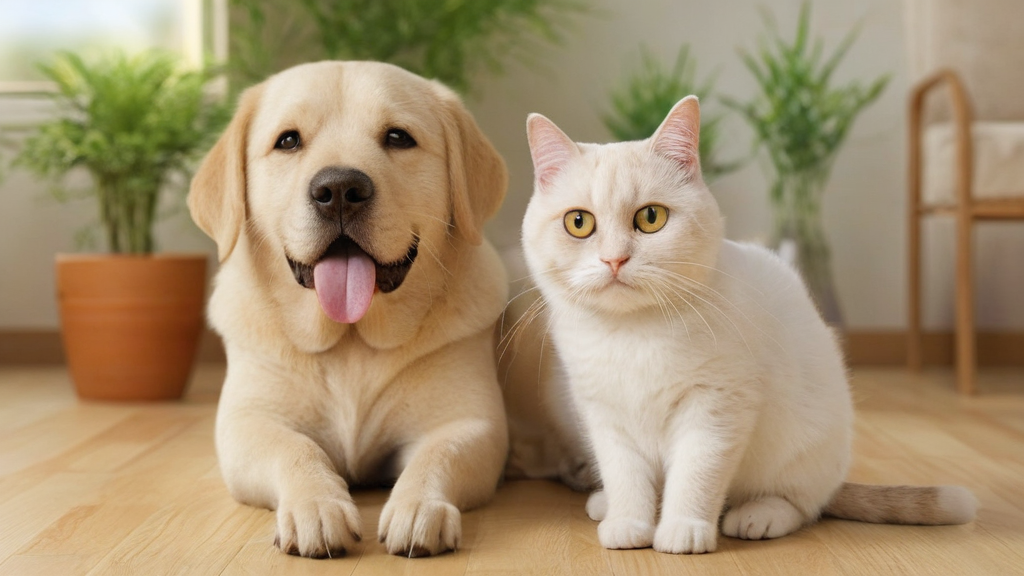
What is Pet Wellness: Comprehensive Overview and Core Principles
Caring for your pet goes beyond regular feeding and occasional veterinary check-ups. Pet wellness represents a holistic approach to maintaining your animal companion’s overall health and quality of life through proactive strategies and comprehensive care.
Understanding the Holistic Nature of Pet Wellness
Pet wellness encompasses a multifaceted approach that addresses physical, mental, and emotional health. It involves preventative measures, nutrition, exercise, mental stimulation, and regular medical assessments designed to optimize your pet’s total well-being.
Key Dimensions of Pet Wellness
- Physical health monitoring
- Nutritional management
- Mental and emotional enrichment
- Preventative medical care
- Age-specific health considerations
Nutrition plays a critical role in pet wellness. High-quality, balanced diets tailored to your pet’s specific age, breed, and health requirements can significantly impact their overall vitality. Veterinary nutritionists recommend selecting foods that provide essential nutrients, support immune function, and maintain optimal body weight.
Preventative Healthcare Strategies
Regular veterinary check-ups are fundamental to pet wellness. These comprehensive examinations help detect potential health issues early, allowing for more effective interventions. Recommended preventative measures include:
- Annual physical examinations
- Routine vaccinations
- Dental health assessments
- Parasite prevention
- Blood and diagnostic screenings
Mental and emotional well-being are equally important aspects of pet wellness. Pets require consistent mental stimulation, social interaction, and environmental enrichment to maintain psychological health. This involves providing engaging toys, interactive play sessions, and opportunities for socialization.
Explore Pet Wellness products here
Exercise and Physical Activity Considerations
Different pets have varying exercise requirements based on their breed, age, and individual characteristics. Regular physical activity helps maintain healthy body weight, supports cardiovascular health, and prevents behavioral issues related to boredom or excess energy.
For dogs, this might include daily walks, fetch games, or agility training. Cats benefit from interactive toys, climbing structures, and play sessions that mimic hunting behaviors. Smaller pets like rabbits and guinea pigs need safe spaces for exploration and movement.
Age-Specific Wellness Approaches
Pet wellness strategies evolve throughout an animal’s life stages. Puppies and kittens require specialized nutrition and frequent veterinary monitoring, while senior pets need more focused healthcare interventions addressing age-related conditions.
Specialized wellness programs often include:
Explore Pet Wellness products here
- Tailored nutrition plans
- Adjusted exercise routines
- More frequent health screenings
- Targeted supplementation
- Pain management strategies
Nutritional Considerations
Selecting appropriate nutrition involves understanding your pet’s unique metabolic needs. Factors like breed, size, activity level, and potential health conditions influence dietary requirements. Consider consulting veterinary professionals to develop personalized nutrition plans.
Technology and Pet Wellness
Modern technological advancements are transforming pet wellness. Wearable health trackers, telehealth consultations, and advanced diagnostic tools enable more precise health monitoring and personalized care strategies.
Implementing a comprehensive pet wellness approach requires commitment, education, and collaboration with veterinary professionals. By prioritizing preventative care, nutrition, mental stimulation, and regular health assessments, pet owners can significantly enhance their companions’ quality of life and longevity.
Remember that each pet is unique, and wellness strategies should be tailored to individual needs, considering factors like breed, age, lifestyle, and specific health considerations.
Essential Components of Holistic Pet Health
Explore Pet Wellness products here
Pet wellness goes beyond traditional veterinary care, encompassing a comprehensive approach to maintaining your furry friend’s overall health and quality of life. Modern pet owners are increasingly recognizing that true health involves a holistic strategy that addresses physical, mental, and emotional well-being.
Nutrition as the Foundation of Pet Wellness
A balanced diet is the cornerstone of optimal pet health. Pets require carefully planned nutrition that meets their specific age, breed, and health requirements. High-quality proteins, essential nutrients, and appropriate calorie intake play crucial roles in supporting:
- Muscle development
- Immune system function
- Metabolic processes
- Energy levels
- Coat and skin health
Physical Fitness and Exercise
Regular physical activity is vital for maintaining your pet’s optimal health. Different animals require varying levels of exercise, but consistent movement helps prevent obesity, supports cardiovascular health, and promotes mental stimulation. Activities should be tailored to your pet’s age, breed, and individual capabilities.
Mental and Emotional Well-being
Pets experience complex emotional landscapes that significantly impact their overall wellness. Mental stimulation through interactive toys, training sessions, and social interactions prevents behavioral issues and supports cognitive function. Stress management techniques, including creating safe environments and maintaining consistent routines, contribute to emotional stability.
Explore Pet Wellness products here
Preventative Healthcare Strategies
Proactive healthcare approaches are essential in detecting and preventing potential health issues. This includes:
- Regular veterinary check-ups
- Comprehensive vaccination protocols
- Parasite prevention
- Dental hygiene maintenance
- Early screening for genetic conditions
Environmental Considerations
The living environment plays a critical role in pet wellness. Factors such as air quality, comfortable resting areas, temperature regulation, and minimal exposure to toxins contribute to overall health. Creating a safe, stimulating environment helps reduce stress and supports your pet’s physical and mental well-being.
Holistic Treatment Approaches
Modern pet wellness increasingly incorporates alternative therapies alongside traditional veterinary medicine. Approaches like acupuncture, massage therapy, and herbal treatments can complement conventional medical interventions, offering comprehensive health support.
Age-Specific Wellness Considerations
Pet wellness needs evolve throughout different life stages. Puppies and kittens require different nutritional and healthcare approaches compared to senior pets. Understanding and adapting to these changing requirements ensures optimal health and longevity.
Explore Pet Wellness products here
Technology and Pet Wellness
Emerging technologies are transforming pet health monitoring. Wearable devices, advanced diagnostic tools, and telemedicine platforms enable pet owners to track health metrics, detect potential issues early, and maintain more informed healthcare practices.
Nutritional Supplementation
Targeted supplements can address specific health needs, supporting joint health, immune function, and addressing potential nutritional gaps. However, supplementation should always be discussed with a veterinary professional to ensure appropriate and safe usage.
Ultimately, pet wellness represents a comprehensive, proactive approach to animal health. By integrating nutrition, physical activity, mental stimulation, preventative care, and personalized attention, pet owners can significantly enhance their companions’ quality of life and longevity.
Preventive Care Strategies for Long-Term Animal Wellness
Caring for your pet goes beyond occasional veterinary visits and treating symptoms. Modern pet wellness represents a comprehensive approach to maintaining your animal companion’s optimal health through proactive strategies and holistic care practices.
Explore Pet Wellness products here
Understanding Comprehensive Animal Health Management
Preventive care focuses on anticipating potential health challenges before they become serious medical issues. This approach involves regular monitoring, strategic interventions, and lifestyle adjustments tailored to your pet’s specific needs.
Core Components of Effective Pet Wellness
- Regular veterinary check-ups
- Nutritional assessment
- Age-appropriate screening
- Vaccination protocols
- Mental and physical stimulation
Nutritional Foundations for Long-Term Health
A balanced diet plays a critical role in maintaining your pet’s overall wellness. Professional nutritionists recommend selecting high-quality food that matches your animal’s age, breed, and specific health requirements. Customized nutrition plans can help prevent obesity, support immune function, and promote optimal metabolic performance.
Essential Dietary Considerations
- Protein quality and quantity
- Balanced micronutrient profile
- Age-specific caloric needs
- Hydration management
Advanced Diagnostic and Monitoring Techniques
Modern veterinary medicine offers sophisticated diagnostic tools that enable early detection of potential health risks. Blood work, genetic screening, and comprehensive physical examinations provide insights into your pet’s internal health status, allowing veterinarians to develop targeted wellness strategies.
Recommended Screening Intervals
| Pet Age | Screening Frequency |
|---|---|
| Puppies/Kittens | Every 3-4 months |
| Adult Pets | Annually |
| Senior Animals | Bi-annually |
Mental and Physical Enrichment Strategies
Wellness extends beyond physical health. Pets require mental stimulation and emotional support to maintain overall well-being. Interactive toys, consistent training, and structured playtime contribute significantly to their psychological health and help prevent behavioral issues.
Explore Pet Wellness products here
Enrichment Activities
- Puzzle feeders
- Regular exercise routines
- Social interaction
- Training sessions
Preventive Healthcare Interventions
Proactive healthcare includes strategic interventions like dental hygiene, parasite prevention, and weight management. Regular dental cleanings can prevent serious systemic health problems, while consistent parasite control protects against potential infections and complications.
Vaccination and Preventive Treatment Schedule
Developing a customized vaccination and preventive treatment plan with your veterinarian ensures comprehensive protection against common health risks. This personalized approach considers your pet’s lifestyle, environment, and individual health profile.
Holistic Wellness Approach
Integrating traditional veterinary medicine with holistic practices like acupuncture, massage, and alternative therapies can provide comprehensive health support. These complementary approaches address physical, emotional, and environmental factors contributing to your pet’s overall wellness.
By implementing these strategic wellness practices, pet owners can significantly enhance their animal companions’ quality of life, potentially extending their lifespan and preventing numerous health complications through proactive, personalized care.
Explore Pet Wellness products here
Nutrition and Exercise: Pillars of Pet Health Management
Maintaining optimal health for pets requires a comprehensive approach that focuses on two critical elements: nutrition and exercise. These foundational aspects play a crucial role in ensuring your furry companions live long, vibrant, and healthy lives.
Proper nutrition forms the cornerstone of pet wellness, providing essential nutrients that support overall health, immune function, and energy levels. Every pet has unique dietary requirements that depend on factors like age, breed, size, and existing health conditions. High-quality pet food should contain a balanced mix of proteins, carbohydrates, healthy fats, vitamins, and minerals to support their specific needs.
Understanding Nutritional Requirements
Different life stages demand varying nutritional approaches. Puppies and kittens require nutrient-dense diets that support rapid growth, while senior pets need carefully calibrated nutrition that supports joint health and metabolism. Consider these key nutritional considerations:
- Protein quality and quantity
- Balanced mineral content
- Essential fatty acids
- Appropriate calorie intake
- Hydration levels
Exercise: A Vital Component of Pet Health
Physical activity is equally important in maintaining your pet’s overall wellness. Regular exercise helps prevent obesity, supports cardiovascular health, and promotes mental stimulation. Each pet requires a tailored exercise routine based on their breed, age, and individual energy levels.
Explore Pet Wellness products here
Benefits of Regular Physical Activity
- Weight management
- Improved muscle tone
- Enhanced mental stimulation
- Reduced behavioral problems
- Better joint mobility
Different pets have varying exercise needs. High-energy breeds like Border Collies or Labrador Retrievers require more intense physical activities, while smaller or older pets might need gentler, shorter exercise sessions. Walking, playing fetch, interactive toys, and supervised outdoor activities can help meet these requirements.
Integrating Nutrition and Exercise
The most effective pet health management strategy involves seamlessly integrating nutrition and exercise. This holistic approach ensures that your pet receives optimal fuel for their physical activities while maintaining a healthy weight and supporting their metabolic functions.
Monitoring and Adjusting
Regular veterinary check-ups are essential for tracking your pet’s health progress. Professional guidance can help you fine-tune nutrition and exercise plans, addressing any emerging health concerns proactively. Blood tests, weight measurements, and comprehensive physical examinations provide insights into your pet’s overall wellness.
Additional Wellness Considerations
- Regular dental care
- Preventative medical treatments
- Mental health stimulation
- Consistent grooming
Pet owners should remain attentive to their animal companions’ changing needs. As pets age, their nutritional and exercise requirements will evolve. Flexibility and responsiveness are key to maintaining their health and happiness.
Explore Pet Wellness products here
Technology and veterinary research continue to advance our understanding of pet wellness. Innovative nutritional supplements, specialized diet plans, and targeted exercise recommendations are constantly emerging, providing pet owners with more sophisticated tools for comprehensive health management.
By prioritizing balanced nutrition and consistent exercise, you can significantly enhance your pet’s quality of life, potentially extending their lifespan and ensuring they remain active, healthy, and happy companions.
Common Challenges in Maintaining Optimal Pet Wellness
Pets bring immense joy and companionship to our lives, but ensuring their optimal health requires dedicated attention and proactive care. Pet owners often encounter multiple challenges that can impact their furry friends’ overall wellness and quality of life.
Nutritional Management Complexities
Maintaining proper nutrition is a critical aspect of pet wellness that many owners struggle with. Each animal has unique dietary requirements based on factors like:
Explore Pet Wellness products here
- Age
- Breed
- Weight
- Activity level
- Underlying health conditions
Diet-Related Obstacles
Many pet owners inadvertently overfeed or provide inappropriate food types, leading to potential health complications. Obesity in pets has become increasingly prevalent, with approximately 60% of cats and 56% of dogs classified as overweight or obese. This excess weight can trigger numerous health issues, including diabetes, joint problems, and reduced mobility.
Exercise and Physical Activity Challenges
Regular physical activity is essential for maintaining optimal pet wellness. However, modern lifestyles and urban living environments often restrict pets’ movement and exercise opportunities. Working professionals might struggle to provide sufficient daily activity for their companions, potentially leading to:
- Muscle weakness
- Weight gain
- Mental health deterioration
- Behavioral problems
Mental Stimulation Requirements
Beyond physical exercise, pets need mental engagement to prevent boredom and stress. Interactive toys, training sessions, and varied environmental experiences contribute significantly to their psychological well-being. Pets lacking mental stimulation may develop destructive behaviors or experience increased anxiety.
Preventative Healthcare Challenges
Regular veterinary check-ups and preventative care are crucial yet often overlooked. Many pet owners delay or skip routine medical examinations due to:
Explore Pet Wellness products here
- Financial constraints
- Time limitations
- Perceived lack of immediate necessity
Vaccination and Parasite Control
Maintaining up-to-date vaccinations and implementing consistent parasite prevention strategies require ongoing commitment. Neglecting these aspects can expose pets to serious health risks, including potentially fatal diseases and chronic health conditions.
Environmental Wellness Considerations
Creating a safe, stress-free environment plays a pivotal role in pet wellness. Urban and suburban settings present unique challenges such as limited outdoor spaces, noise pollution, and potential exposure to environmental toxins. Pet owners must actively manage these factors to support their animals’ holistic health.
Stress Management
Pets are sensitive to environmental changes and can experience significant stress from factors like:
- Household disruptions
- New family members
- Moving locations
- Changes in routine
Technology and Wellness Monitoring
Emerging technologies offer innovative solutions for tracking pet health. Wearable devices, smartphone applications, and advanced diagnostic tools enable more precise monitoring of pets’ physical condition, activity levels, and potential health concerns.
Explore Pet Wellness products here
Successfully navigating these wellness challenges requires a comprehensive, proactive approach. Pet owners must remain informed, adaptable, and committed to their companions’ holistic health. By understanding and addressing these common obstacles, individuals can help ensure their pets live longer, healthier, and more fulfilling lives.
Key Takeaway:
Key Takeaway: Understanding Pet Wellness for Optimal Animal Health
Pet wellness is a comprehensive approach to animal healthcare that goes far beyond traditional veterinary treatments. It’s a holistic strategy focused on proactively maintaining your pet’s overall health and quality of life through integrated care, preventive measures, and attentive management.
The core principle of pet wellness is prevention rather than cure. This means creating a comprehensive health plan that addresses multiple aspects of your pet’s physical, mental, and emotional well-being. By understanding and implementing a holistic approach, pet owners can significantly enhance their animal companion’s longevity, happiness, and overall vitality.
Key elements of successful pet wellness include:
Explore Pet Wellness products here
- Comprehensive Health Monitoring Pet wellness requires regular check-ups, comprehensive health screenings, and proactive medical assessments. These evaluations help detect potential health issues early, allowing for timely interventions and preventing more serious conditions from developing.
- Nutrition and Diet Management A balanced, high-quality diet tailored to your pet’s specific age, breed, and health requirements is crucial. Proper nutrition supports immune function, maintains healthy weight, and provides essential nutrients for optimal bodily functions.
- Regular Exercise and Mental Stimulation Physical activity and mental engagement are fundamental to pet wellness. Regular exercise helps maintain healthy weight, supports cardiovascular health, and prevents obesity-related complications. Mental stimulation through interactive toys, training, and social interactions prevents boredom and supports cognitive health.
- Preventive Healthcare StrategiesExplore Pet Wellness products here
Implementing consistent preventive care includes:
- Regular vaccinations
- Parasite prevention
- Dental hygiene
- Weight management
- Annual health screenings
- Understanding Individual Pet Needs Each animal is unique, requiring personalized wellness approaches. Factors like breed, age, lifestyle, and existing health conditions influence the most appropriate wellness strategy.
- Holistic Health Considerations Beyond physical health, pet wellness encompasses mental and emotional well-being. This includes managing stress, providing social interactions, and creating a supportive home environment.
Challenges in maintaining pet wellness include:
- Financial constraints of comprehensive healthcare
- Time management for consistent care
- Understanding complex health needs
- Staying informed about evolving veterinary practices
The ultimate goal of pet wellness is creating a proactive, integrated approach that supports your pet’s health throughout their entire life cycle. By investing time, resources, and attention in comprehensive care, pet owners can ensure their companions enjoy longer, healthier, and more fulfilling lives.
Explore Pet Wellness products here
Successful pet wellness is a collaborative effort between pet owners and veterinary professionals, requiring continuous learning, adaptation, and genuine commitment to animal health and happiness.
Conclusion
Pet wellness is a multifaceted approach that demands consistent commitment, awareness, and proactive care from pet owners. By understanding the intricate balance of physical, mental, and nutritional needs, you can transform your pet’s quality of life and potentially extend their years of happiness and health.
The journey to optimal pet wellness isn’t about perfection, but about making informed, holistic choices. Every small step—whether it’s selecting high-quality nutrition, maintaining regular veterinary check-ups, providing mental stimulation, or ensuring consistent exercise—contributes significantly to your pet’s overall well-being.
Embracing a comprehensive wellness strategy means recognizing that each animal is unique. What works for one pet might not be ideal for another. This personalized approach requires ongoing education, adaptability, and a genuine commitment to understanding your pet’s individual needs and health signals.
Financial investment in preventive care might seem substantial initially, but it ultimately saves both money and emotional stress by reducing the likelihood of complex health issues. Regular screenings, balanced nutrition, mental engagement, and proactive healthcare are not expenses but strategic investments in your pet’s long-term vitality.
Explore Pet Wellness products here
Ultimately, pet wellness transcends medical protocols—it’s a profound expression of love and responsibility. By prioritizing your pet’s holistic health, you’re not just caring for an animal, but nurturing a cherished companion who depends entirely on your guidance and support. The rewards of this commitment are immeasurable: a vibrant, happy pet who shares life’s journey with unwavering loyalty and affection.




